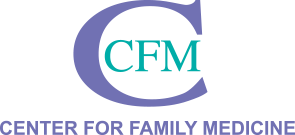Small Changes You Can Make to Improve Your Cholesterol

September is National Cholesterol Education Month. Now is a great time for Center for Family Medicine to discuss how to improve cholesterol and its role in your health, especially the dangers of high cholesterol if gone unchecked.
What is cholesterol?
Your liver makes all the cholesterol your body needs to function properly. Cholesterol is a fat-like substance that is part of the process of:
- bile production in the liver
- hormone production
- forming and maintaining cell membranes
- nerve cell insulation
- vitamin D production
Additional cholesterol you get in the bloodstream comes from the food you consume with high saturated fat content. Food sources of cholesterol include dairy, meat and meat products, eggs, shellfish, margarine and other spreads made from fats, suet and drippings. While too much cholesterol is bad, not all cholesterol is considered bad for you.
- LDL or low-density lipoprotein will sometimes be referred to as “bad” cholesterol because it is a contributor to the plaque build-up in your arteries.
- HDL or high-density lipoprotein is the “good” cholesterol as it takes some bad LDL cholesterol away from the arteries, thus lessening plaque build-up.
Why is education about cholesterol important?
Many people would argue that they probably would not feel well if their cholesterol was very high and it was as dangerous as the doctors tell them. The fact is that, in many cases, you won’t feel the effects of high levels of cholesterol, or know you have high cholesterol (unless you had blood tests done), until it is too late and you suffer a stroke or a heart attack which is still the number one cause of death in the US today. The recommendation is to have your cholesterol levels checked every 4-6 years if you have normal levels, or more often if you already have heart disease or high cholesterol levels from previous tests or because of familial hypercholesterolemia.
What causes high cholesterol?
Aside from your genetics being the cause of your high cholesterol, your food and lifestyle choices will have the most profound impact. Everyone knows that the best things you can do for your overall health is to eat a healthy diet and exercise. However, not everyone does, whatever may be the reason. For some, it is not feasible due to circumstances beyond their control. Or, they choose to indulge in delicious, yet not-so-good-for-you food, like a lot of processed or take-out food, which is often high in saturated fats. In both cases, these may be part of the reason why cholesterol levels may be elevated. Education is essential in understanding cholesterol and its effect on your health.
How can you lower your cholesterol?
The simplest ways to lower your cholesterol are to make dietary changes and move more. It could be something as simple as swapping out that fried chicken for baked or grilled chicken with a side salad with lemon juice and a touch of olive oil, not smothered in dressing. Or, parking at the end of the parking lot and walking to the store every time you shop. Other ways to improve your cholesterol levels include but are not limited to:
- eating lower fat foods including lots of fruits, vegetables, and whole grains
- if you have to eat something high in fat, limit the amount and frequency of consumption
- if you smoke, this would be a good reason to quit
- limit your alcohol intake or eliminate it completely
- plan on a minimum of 30 min of daily exercise, even something as simple as walking around your local park
To improve your cholesterol may not be easy, but it is well worth the benefits you will feel as your health improves with the changes you have made. For some, just small changes are enough to see an improvement. For others, dietary and lifestyle changes might not be enough to reach the desired outcome and they may require medication. In either case, you should speak with a Center for Family Medicine physician for guidance and clarification to any questions you may have. Good health is vital to living the best life possible.


